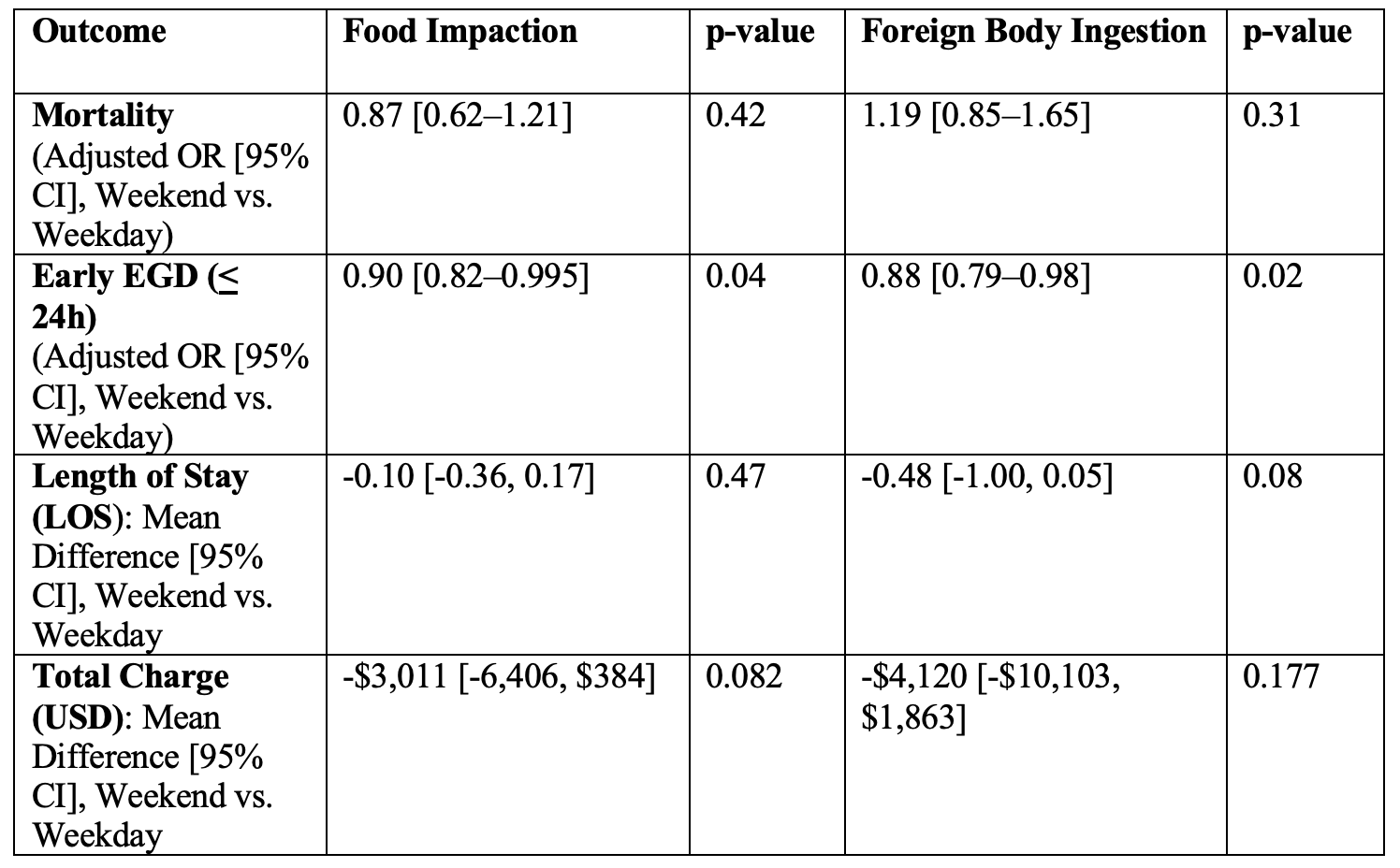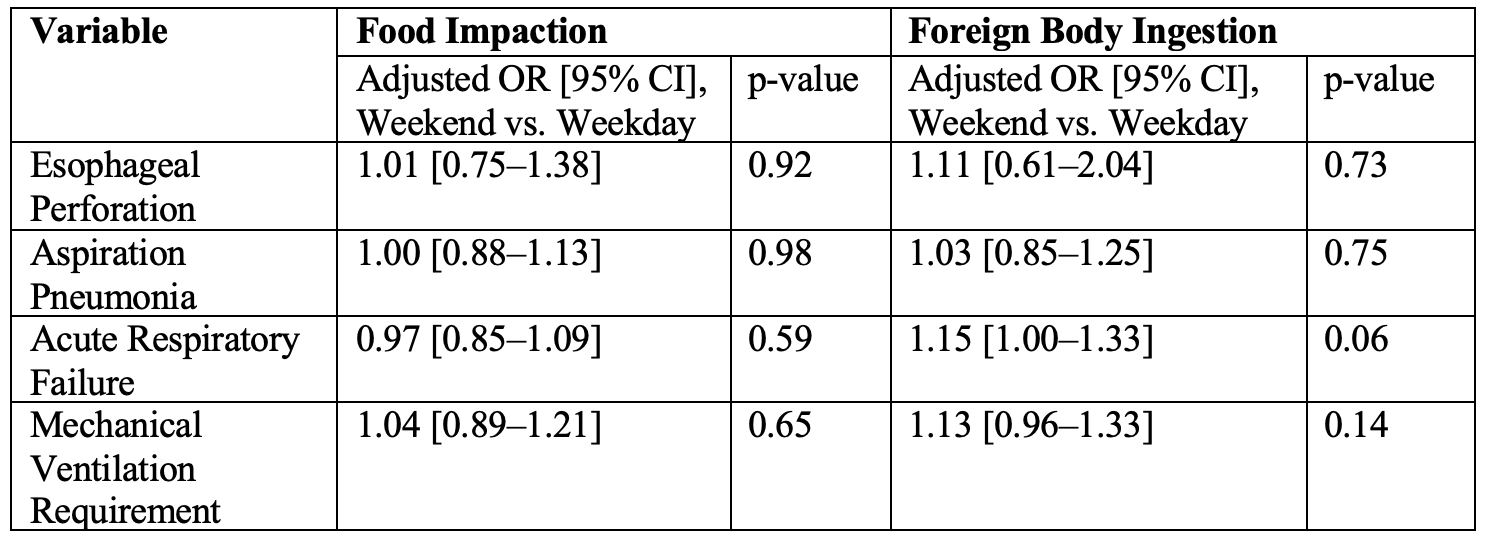Monday Poster Session
Category: Esophagus
P2811 - Weekend Admissions for Food Impaction and Foreign Body Ingestion Are Associated With Delays in Endoscopy but Without Increased Mortality or Major Complication Risk
Monday, October 27, 2025
10:30 AM - 4:00 PM PDT
Location: Exhibit Hall
- JL
James Lee, MD
Stony Brook Medicine
Stony Brook, NY
Presenting Author(s)
James Lee, MD1, Ballakur D. Rao, MD2, Rahul Tripathi, MD1, Jasmine Lee, MD3, Daniel Jamorabo, MD4
1Stony Brook Medicine, Stony Brook, NY; 2Stony Brook Medicine, Stony Brook, NY; 3Jefferson Health, Philadelphia, PA; 4Northwell Health, Forest Hills, NY
Introduction: Prior studies have identified a “weekend effect” wherein patients admitted on weekends for gastroenterological emergencies face delays or worse outcomes compared to those admitted during weekdays. We wanted to determine whether or not a weekend effect exists for patients hospitalized with esophageal food impaction or foreign body ingestion.
Methods: We performed a retrospective cohort analysis using the National Inpatient Sample (NIS) from 2016–2022. Adult patients (≥18 years) admitted non-electively with esophageal food impaction or foreign body ingestion were identified using validated ICD-10-CM codes. We compared demographics, hospital characteristics, timing of endoscopy, and outcomes between weekend and weekday admissions. Survey-weighted analyses were used to generate nationally representative estimates. Multivariate regression analyses were used to adjust for demographics, Charlson comorbidity index and hospital features (region, size, teaching status, location).
Results: There were 50,160 weighted food impactions and 48,715 weighted foreign body ingestion admissions, of whom 28% (13,995) and 26% (12,670), respectively, were hospitalized on weekends. Weekend patients were slightly younger for both food impaction (68.1 vs. 69.2 years) and foreign body ingestion (51.2 vs. 53.0 years). Overall, 85.8% of food impaction and 50.2% of foreign body ingestion cases underwent EGD. The mean time to EGD was 1.02 days for food impaction (1.06 days for weekend vs. 1.01 days for weekday admissions) and 2.25 days for foreign body ingestion (2.33 days for weekend vs. 2.22 days for weekday admissions).
Weekend admissions were associated with lower odds of early EGD (< 24h) for food impaction (aOR 0.90, 95% CI: 0.82–0.995; p=0.04) and foreign body ingestion (aOR 0.88, 95% CI: 0.79–0.98; p=0.02). No significant differences were observed in hospital mortality, esophageal perforation, aspiration pneumonia, acute respiratory failure or mechanical ventilation on weekend vs weekday admissions (Tables 1 & 2).
Discussion: Weekend admissions for esophageal food impaction or foreign body ingestion were associated with delayed endoscopy, with significantly lower odds of early EGD. However, this delay did not lead to higher rates of mortality or major complications. These findings suggest a procedural weekend effect without adverse clinical impact.

Figure: Table 1. Inpatient Outcomes Comparing Weekend and Weekday Admissions for Food Impaction and Foreign Body Ingestion

Figure: Table 2. Complications in Foreign Body Ingestion and Food Impaction over the Weekend compared to Weekday Admissions
Disclosures:
James Lee indicated no relevant financial relationships.
Ballakur Rao indicated no relevant financial relationships.
Rahul Tripathi indicated no relevant financial relationships.
Jasmine Lee indicated no relevant financial relationships.
Daniel Jamorabo indicated no relevant financial relationships.
James Lee, MD1, Ballakur D. Rao, MD2, Rahul Tripathi, MD1, Jasmine Lee, MD3, Daniel Jamorabo, MD4. P2811 - Weekend Admissions for Food Impaction and Foreign Body Ingestion Are Associated With Delays in Endoscopy but Without Increased Mortality or Major Complication Risk, ACG 2025 Annual Scientific Meeting Abstracts. Phoenix, AZ: American College of Gastroenterology.
1Stony Brook Medicine, Stony Brook, NY; 2Stony Brook Medicine, Stony Brook, NY; 3Jefferson Health, Philadelphia, PA; 4Northwell Health, Forest Hills, NY
Introduction: Prior studies have identified a “weekend effect” wherein patients admitted on weekends for gastroenterological emergencies face delays or worse outcomes compared to those admitted during weekdays. We wanted to determine whether or not a weekend effect exists for patients hospitalized with esophageal food impaction or foreign body ingestion.
Methods: We performed a retrospective cohort analysis using the National Inpatient Sample (NIS) from 2016–2022. Adult patients (≥18 years) admitted non-electively with esophageal food impaction or foreign body ingestion were identified using validated ICD-10-CM codes. We compared demographics, hospital characteristics, timing of endoscopy, and outcomes between weekend and weekday admissions. Survey-weighted analyses were used to generate nationally representative estimates. Multivariate regression analyses were used to adjust for demographics, Charlson comorbidity index and hospital features (region, size, teaching status, location).
Results: There were 50,160 weighted food impactions and 48,715 weighted foreign body ingestion admissions, of whom 28% (13,995) and 26% (12,670), respectively, were hospitalized on weekends. Weekend patients were slightly younger for both food impaction (68.1 vs. 69.2 years) and foreign body ingestion (51.2 vs. 53.0 years). Overall, 85.8% of food impaction and 50.2% of foreign body ingestion cases underwent EGD. The mean time to EGD was 1.02 days for food impaction (1.06 days for weekend vs. 1.01 days for weekday admissions) and 2.25 days for foreign body ingestion (2.33 days for weekend vs. 2.22 days for weekday admissions).
Weekend admissions were associated with lower odds of early EGD (< 24h) for food impaction (aOR 0.90, 95% CI: 0.82–0.995; p=0.04) and foreign body ingestion (aOR 0.88, 95% CI: 0.79–0.98; p=0.02). No significant differences were observed in hospital mortality, esophageal perforation, aspiration pneumonia, acute respiratory failure or mechanical ventilation on weekend vs weekday admissions (Tables 1 & 2).
Discussion: Weekend admissions for esophageal food impaction or foreign body ingestion were associated with delayed endoscopy, with significantly lower odds of early EGD. However, this delay did not lead to higher rates of mortality or major complications. These findings suggest a procedural weekend effect without adverse clinical impact.

Figure: Table 1. Inpatient Outcomes Comparing Weekend and Weekday Admissions for Food Impaction and Foreign Body Ingestion

Figure: Table 2. Complications in Foreign Body Ingestion and Food Impaction over the Weekend compared to Weekday Admissions
Disclosures:
James Lee indicated no relevant financial relationships.
Ballakur Rao indicated no relevant financial relationships.
Rahul Tripathi indicated no relevant financial relationships.
Jasmine Lee indicated no relevant financial relationships.
Daniel Jamorabo indicated no relevant financial relationships.
James Lee, MD1, Ballakur D. Rao, MD2, Rahul Tripathi, MD1, Jasmine Lee, MD3, Daniel Jamorabo, MD4. P2811 - Weekend Admissions for Food Impaction and Foreign Body Ingestion Are Associated With Delays in Endoscopy but Without Increased Mortality or Major Complication Risk, ACG 2025 Annual Scientific Meeting Abstracts. Phoenix, AZ: American College of Gastroenterology.
